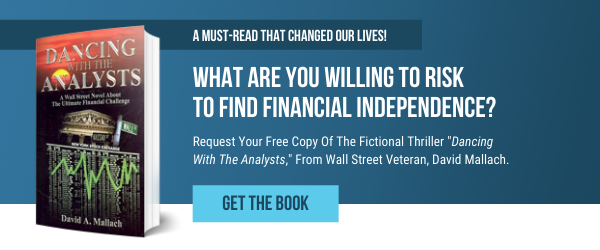These days I’m hearing a lot of questions – from clients, friends and family, and in the media, about whether we are about to head into a recession. For many, it’s a foregone conclusion that there's going to be a recession, based on the Fed raising interest rates, which in turn would suppress the markets. Maybe it caught your attention, too. That’s normal.
The impulse for us to get out of equities in anticipation of the markets going down is unavoidable and eternal. It's deeply ingrained in our human nature. And it's just another reason why being human is not good for being an investor.
A Long-Term Financial Plan Begins With Setting Goals
As advisors, it’s important for us to never engage directly with economic or market forecasting or prediction. I'll also say that while we never want to engage in forecasting or predictions, we also don't want to spend any time arguing that whatever forecast is out there is right or wrong.
First, we stand on a little bit of a moral high ground when these corrections or bear markets are merely blips in the context of a lifetime of being an investor. Second, the markets and the economy cannot be timed or forecasted. Third, all this is irrelevant to our clients and successful investors who are goal-focused and planning-oriented with an eye to the future.
Create a Goal-Oriented Financial Plan
Set financial goals. To be successful now and in the future, you need short and long-term goals.
Prioritize. Determine which goals not only matter the most to you, but that may take additional time and effort to achieve. Identify quantifiable measures of success.
Why Is Financial Planning Important?
The reason you get up in the morning may be different from mine. But, we all have motivations and goals that are an integral part of who we are. Financial planning is the roadmap to get you to your most cherished goals and offers a stable alternative to falling into the emotional investing trap.
A Goal-Focused Plan Cannot Be Timed by the Markets
It’s August 2022. How many times have you or I heard this month, “Oh my goodness, we’re headed into a recession, the markets are heading down for who knows how long, and this time it’s different…” There’s a lot of talk (as is to be expected) about “waiting it out,” as if the markets could be timed!
The markets cannot be timed: the only way to capture the full premium of what the equity markets are going to provide over the next 10, 20, 30 years is to be willing to be fully invested. Being fully invested means you are also invested during these times of temporary decline. The financial media, the newspapers or the talking heads, and the gurus, aren’t helping us, right? Everybody is out there quoting the highest of probabilities that something awful is going to happen.
And you know what? They may be right, I suppose. Someone is always predicting the next big catastrophe. This time, I guess they may be right. The appearance of being correct comes about with regularity. Just like a broken clock tells the time correctly twice a day, so do these predictions that occasionally come true.
Let me tell you though that all this is irrelevant to our strategy. I'll repeat it: this is irrelevant to our strategy. A long-term planning-based approach assumes that you will never gain a consistent advantage by timing the markets. This is one of the highest truths at Beck Bode.
Why Market Timing Isn’t A Long-Term Strategy
We Understand the Impulsiveness of Human Nature
Trying to get out right before something bad happens or trying to figure out when the next downturn is going to occur, is simply human nature. An emotional investing decision based on negativity is a very real impulse, but at the end of the day, even if it’s correct, it's only half of a strategy. That same human impulse of wanting to get out comes with another impulse: the impulse to get back in.
The only way that anybody is going to feel justified about their decision to get out is perhaps when they get the impulse to get back in. And what drives the impulse to get back in? Optimism and positivity. Mind you, when we hit market bottoms and the markets start to move higher, you don’t see the financial media and all the gurus suddenly come out and declare that the world is a great place.
In March of 2009, when - according to the media - the sky was falling, we were knee-deep in a recession. In 2020, right after the pandemic set in, we were also in the middle of a really bad downturn.
As was to be expected, the Ivy League financial gurus came out and said things like, “Well, this may not be the right time to get back into equities.” Didn’t that turn out to be the pinnacle of bad advice? It caused a lot of folks to lock in their losses and prevent their exposure to recovery. Getting in and getting out are impulses; they're not strategies. And just like two wrongs don’t make a right, two impulses don't make a strategy.
Market Corrections are More Frequent Than You Think
This feeling of being able to act in a way to get you ahead of a market is possibly one of the most detrimental feelings you can have when it comes to the long-term health of your portfolio, or better said the long possibility of achieving your goals and objectives.
I’ve said this, I feel, a million times, and even so, it bears a quick review. Corrections are so damn frequent. Consider this: When you average all of the corrections that we have seen since 1980, they equate to a 14% average annual drop. In 1980, the S&P 500 was at about 106 in terms of price, and now look at where it is today. Since 1980 we have averaged about 10% per year in return, and how many bear markets have we seen in the same time? How many corrections in bear markets have we seen over the last four years?
You could make an argument that we've seen three bear markets, where the market fell more than 20%. We've seen three very substantial falls in the market plus one that almost qualifies. Despite all this, look at where we are.
Listening to the media or some guru that says it’s likely there will be some big corrective market event coming is like predicting heavy rainfall in March and April next year. It’s utterly meaningless. Besides, when a correction comes, and it always does, it’s just another market movement, a blip on the overall radar screen.
Don’t Let the Headlines Scare You
We know all the truths. We talk about them a lot here. The main takeaway is to tune out the noise. Do whatever it takes: get your earplugs, don’t open your statements, don’t listen to what’s on the news, on the internet, in your social media feeds. Just don’t do it.
Consuming all these predictions and prognostications takes your focus away from what will get you to your objectives: act continuously and confidently on a goals-based plan and never, ever let emotional investing get the best of you. No one says it better than the billionaire investor, Warren Buffett, “You can’t predict what stocks will do in the short run, but you can predict that American business will do fine over time.”
At Beck Bode we are here to work with you to meet your goals, one planned and patient step at a time. Learn more about financial planning.
Ben Beck is Managing Partner & Chief Investment Officer at Beck Bode, a deliberately different wealth management firm with a unique view on investing, business and life.

 Benjamin Beck, CFP®
Benjamin Beck, CFP®